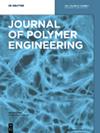Morphologies, structures, and properties on blends of triblock copolymers and linear low-density polyethylene
IF 1.7
4区 工程技术
Q4 POLYMER SCIENCE
引用次数: 0
Abstract
Focusing on the study of the phase separation behavior of triblock copolymer and linear low-density polyethylene (LLDPE) systems helps to understand the influence of microstructure on the properties of poly(vinylcyclohexane)-b- poly(ethylene)-b-poly(vinylcyclohexane) (PVCH-PE-PVCH/LLDPE) blends. We prepared a series of blends of LLDPE and PVCH-PE-PVCH and explained their compatibility from the microstructure. The research findings indicate that despite having similar block compositions, PVCH-PE-PVCH with a higher molecular weight exhibits significantly stronger phase separation and crystallization ability compared to PVCH-PE-PVCH with lower molecular weight. In PVCH-PE-PVCH/LLDPE blends, the addition of 10 %, 20 %, and 30 % LLDPE induces earlier crystallization and crystal phase separation of polyethylene (PE) fragments. In addition, compared to the lower molecular weight of PVCH-PE-PVCH, the higher molecular weight of PVCH-PE-PVCH exhibits a higher tendency for independent crystallization and shows significant crystal phase separation during the cooling crystallization process when blended with LLDPE. The PE segments in the lower molecular weight of PVCH-PE-PVCH can more easily enter the nanoscale domain of LLDPE. Impact fracture electron microscopy also reveals better compatibility between the lower molecular weight of PVCH-PE-PVCH and LLDPE compared to the higher molecular weight of PVCH-PE-PVCH. Furthermore, the blends of lower molecular weight of PVCH-PE-PVCH and LLDPE exhibit a greater growth rate in elongation at break.三嵌段共聚物与线性低密度聚乙烯混合物的形态、结构和性能
重点研究三嵌段共聚物和线性低密度聚乙烯(LLDPE)体系的相分离行为有助于了解微观结构对聚(乙烯基环己烷)-b-聚(乙烯)-b-聚(乙烯基环己烷)(PVCH-PE-PVCH/LLDPE)共混物性能的影响。我们制备了一系列 LLDPE 和 PVCH-PE-PVCH 的共混物,并从微观结构上解释了它们的相容性。研究结果表明,尽管具有相似的嵌段组成,但与分子量较低的 PVCH-PE-PVCH 相比,分子量较高的 PVCH-PE-PVCH 表现出更强的相分离和结晶能力。在 PVCH-PE-PVCH/LLDPE混合物中,添加 10%、20% 和 30% 的 LLDPE 会促使聚乙烯(PE)片段提前结晶和晶相分离。此外,与分子量较低的 PVCH-PE-PVCH 相比,分子量较高的 PVCH-PE-PVCH 在与 LLDPE 混合时,表现出更高的独立结晶趋势,并在冷却结晶过程中出现明显的晶相分离。分子量较低的 PVCH-PE-PVCH 中的 PE 段更容易进入 LLDPE 的纳米级域。冲击断裂电子显微镜还显示,与较高分子量的 PVCH-PE-PVCH 相比,较低分子量的 PVCH-PE-PVCH 与 LLDPE 的相容性更好。此外,较低分子量的 PVCH-PE-PVCH 和 LLDPE 的混合物在断裂伸长率方面表现出更高的增长率。
本文章由计算机程序翻译,如有差异,请以英文原文为准。
求助全文
约1分钟内获得全文
求助全文
来源期刊

Journal of Polymer Engineering
工程技术-高分子科学
CiteScore
3.20
自引率
5.00%
发文量
95
审稿时长
2.5 months
期刊介绍:
Journal of Polymer Engineering publishes reviews, original basic and applied research contributions as well as recent technological developments in polymer engineering. Polymer engineering is a strongly interdisciplinary field and papers published by the journal may span areas such as polymer physics, polymer processing and engineering of polymer-based materials and their applications. The editors and the publisher are committed to high quality standards and rapid handling of the peer review and publication processes.
 求助内容:
求助内容: 应助结果提醒方式:
应助结果提醒方式:


